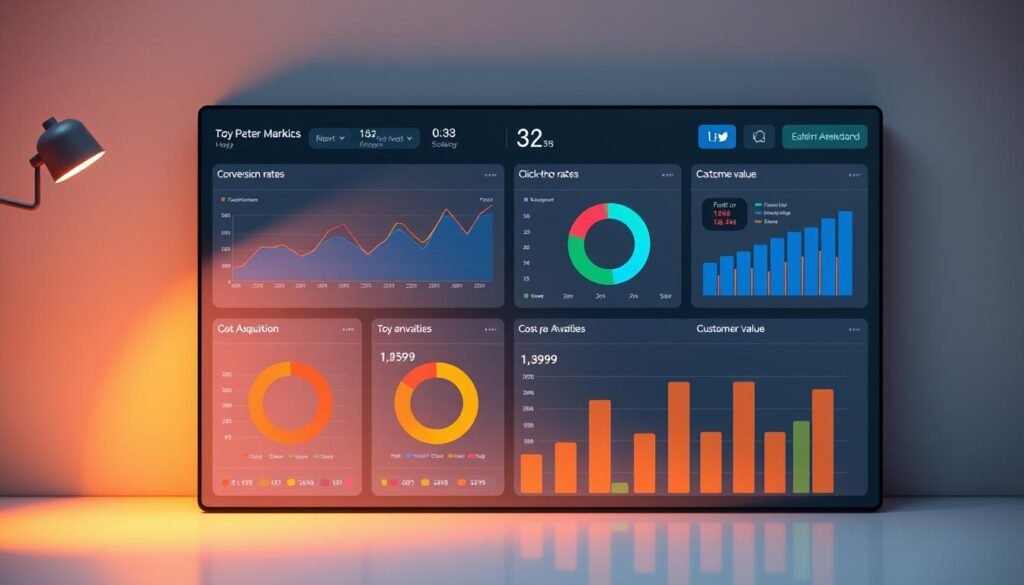Discover the Power of Performance Marketing: What It Is
At Conversions, we share valuable insights into performance marketing. This digital marketing type aims to hit specific goals like getting leads or boosting sales online. It’s key for businesses to reach their audience and meet their goals.
We’re leaders in performance marketing, offering expert advice on strategies and best practices. This helps businesses tackle the digital marketing world. With performance marketing, companies can make their marketing better, boost conversions, and grow their revenue.
Introduction to Performance Marketing
Performance marketing is all about getting results in digital marketing. It lets businesses see how well their campaigns work and make smart choices based on data. By understanding performance marketing, companies can make campaigns that really connect with their audience, leading to real results and a good return on investment.
Key Takeaways
- Performance marketing is a type of digital marketing that focuses on achieving specific goals
- It allows businesses to reach their target audience and achieve their objectives through online advertising
- Performance marketing is a results-driven approach to digital marketing
- It enables businesses to measure the effectiveness of their marketing campaigns
- By leveraging performance marketing, companies can optimize their marketing efforts and drive revenue growth
What Is Performance Marketing: A Comprehensive Overview
At Conversions, we aim to teach you about performance marketing. It includes search engine optimization, pay-per-click ads, and social media marketing. These strategies help businesses meet specific goals like boosting website traffic or sales.
Performance marketing is all about getting results. It’s different from traditional marketing because it focuses on measurable outcomes. This way, businesses can see how well their campaigns are doing and make changes to get better results.
- Targeted advertising to reach specific audiences
- Measurable outcomes to track campaign effectiveness
- Continuous optimization to improve results
By learning about performance marketing and using digital channels, businesses can create strategies that really work. This leads to better results and success.
The Core Channels of Performance Marketing
At the heart of every successful performance marketing campaign are the right channels. Performance marketing channels, such as search engines, social media platforms, and affiliate networks, play a crucial role in reaching the target audience. By leveraging these digital marketing platforms, businesses can create targeted campaigns that drive meaningful results.
When it comes to selecting the most effective channels for specific marketing goals, it’s essential to consider the benefits and drawbacks of each option. For instance, search engines offer a wide reach and targeting capabilities, while social media platforms provide opportunities for brand awareness and engagement. Affiliate networks, on the other hand, can help businesses tap into new audiences and drive conversions.
Some of the key performance marketing channels include:
- Search engines, such as Google and Bing
- Social media platforms, like Facebook and Twitter
- Affiliate networks, including Commission Junction and ShareASale
- Online advertising networks, such as Google AdSense and AdMob
By understanding the core channels of performance marketing and how to effectively utilize them, businesses can create campaigns that reach their desired audience and drive meaningful results.
As businesses navigate the complex landscape of performance marketing, it’s essential to stay up-to-date on the latest trends and best practices. By doing so, they can optimize their campaigns for maximum ROI and achieve their marketing goals. Whether through search engines, social media platforms, or affiliate networks, the right performance marketing channels can make all the difference in driving success.
Understanding Performance Marketing Models
At Conversions, we help businesses grasp the different performance marketing models. These include cost per click, cost per lead, cost per action, and cost per sale. Each model has its own strengths and weaknesses.
Choosing the right model depends on your marketing goals. For example, cost per click is great for driving website traffic. But if you want leads, cost per lead might be better.
Key Performance Marketing Models
- Cost per click: This model charges for each ad click.
- Cost per lead: This model charges for each lead, like when someone fills out a form.
- Cost per action: This model charges for each action, like a purchase.
Knowing the different performance marketing models helps businesses get better results. Our team at Conversions guides you through these options. We help you pick the best model for your needs.
Essential Performance Marketing Metrics and KPIs
At the heart of successful performance marketing lies the ability to track and measure key metrics. Performance marketing metrics such as click-through rate, conversion rate, and return on ad spend are crucial. They help understand a campaign’s effectiveness. By monitoring these metrics, businesses can make data-driven decisions to optimize their marketing efforts and improve overall performance.
Key performance indicators (KPIs) play a vital role in campaign optimization. They help marketers identify areas of improvement and allocate resources more efficiently. Some essential KPIs for performance marketing include:
- Click-through rate (CTR)
- Conversion rate
- Return on ad spend (ROAS)
- Cost per acquisition (CPA)
By focusing on these performance marketing metrics and KPIs, businesses can refine their marketing strategies and achieve better results. Campaign optimization is an ongoing process that requires continuous monitoring and adjustment. By leveraging data and analytics, marketers can unlock the full potential of their performance marketing campaigns and drive meaningful growth.

Building Effective Performance Marketing Strategies
At Conversions, we aim to help businesses craft effective performance marketing strategies. These strategies should drive meaningful results and boost their return on investment. To succeed, it’s key to set clear goals, target the right audience, and manage budgets wisely. This way, businesses can create campaigns that truly connect with their audience, leading to better results.
In performance marketing, audience targeting is a must. It means understanding who your audience is, what they need, and what they like. By using data and analytics, businesses can learn a lot about their audience. This knowledge helps in creating campaigns that really work. Also, campaign optimization is crucial. It helps businesses make their campaigns better and more profitable.
To create effective performance marketing strategies, businesses should focus on a few key things:
- Setting clear and measurable campaign objectives
- Targeting the right audience through data-driven insights
- Allocating budget effectively to maximize return on investment
By using these elements, businesses can make campaigns that really deliver. By focusing on performance marketing strategies and audience targeting, they can craft campaigns that speak directly to their audience. This approach leads to better campaign optimization and a higher return on investment.
Tools and Technologies for Performance Marketing Success
Every successful performance marketing campaign relies on the right tools and technologies. Using performance marketing tools can make efforts more efficient and effective. There are many options, like analytics platforms and tracking software, each tailored for different marketing goals.
Choosing the best tools depends on a business’s specific needs and goals. Some might need advanced analytics platforms to track campaign success. Others might prefer tracking software to see how their marketing affects sales.

- Evaluating the features and capabilities of different performance marketing tools
- Assessing the scalability and flexibility of analytics platforms and tracking software
- Considering the cost and return on investment of various tools and technologies
By picking and using the right performance marketing tools, businesses can boost their marketing. They can see better results and achieve more success. Whether it’s through analytics platforms, tracking software, or other tech, the goal is to find what works best for their goals.
Common Performance Marketing Challenges and Solutions
Our team at Conversions is here to help businesses tackle common performance marketing hurdles. One big performance marketing challenge is low conversion rates. We tackle this by constantly optimizing campaigns. By looking at data and tweaking the campaign, we help businesses boost their conversion rates and increase sales.
Another issue is high cost per acquisition. We solve this by smart budget allocation. By putting budget into the most effective channels and campaigns, we help businesses cut their cost per acquisition. This way, they see better returns on their investment. Some common performance marketing challenges include:
- Low conversion rates
- High cost per acquisition
- Difficulty in scaling campaigns
To beat these challenges, businesses should focus on campaign optimization and budget allocation. By keeping a close eye on and tweaking their campaigns, businesses can do better and achieve more. Our team at Conversions is all in on helping businesses thrive in performance marketing and conquer common performance marketing challenges.
Best Practices for Performance Marketing Campaigns
Successful performance marketing campaigns need strategic planning, data analysis, and creative work. By using the best practices, businesses can boost their online presence and increase conversions. Making decisions based on data is key, as it helps marketers choose wisely with real-time insights.
Good performance marketing also means creative optimization. This means always testing and improving ad creatives to connect better with the audience. This effort boosts campaign results and return on investment. By focusing on data and creative improvement, marketers can make campaigns that work well and show real results.
- Setting clear goals and KPIs for campaigns
- Using analytics tools to track and improve campaign results
- Always testing and refining ad creatives and targeting
By sticking to these best practices and performance marketing principles, businesses can reach their full online marketing potential. This leads to lasting success.
Conclusion: Taking Your Performance Marketing to the Next Level
At Conversions, we aim to help businesses grow their performance marketing. By using the strategies and best practices in this guide, you can reach your digital marketing goals. This will help you get the results you want.
It’s important to keep learning and getting better in performance marketing. Stay current with new trends and technologies. Follow industry leaders, go to webinars, and check out online resources. This way, you can make smarter choices and improve your campaigns.
The journey in performance marketing never ends, and we’re here to help. Contact us for personalized advice, strategy, or help with implementing your marketing plans. We’re ready to help you grow and reach your full potential.






